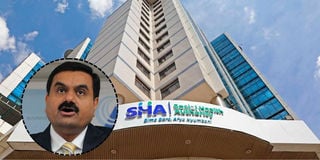
Social Health Authority building, Nairobi in this picture taken on October 6, 2024. (Inset) Chairman of the Adani Group Gautam Adani.
On January 24 at 3.30pm Boniface Mungania, Safaricom’s director in charge of public sector digital transformation, led a team of seven individuals in prayer at an Afya House boardroom.
It was the second negotiation meeting held in a span of five days. Safaricom had earlier handed in a technical and financial proposal for the project under a tender the Ministry of Health booked in its budget books for the 2023/24 financial year, and the meetings were to attempt to save the taxpayer some coins.
Liti Wambua, Antony Lenaiara, Ryan Nyotu, Jeremiah Mumo, Michael Thuita and Catherine Kimira represented the Ministry of Health. Mr Mungania and Felix Rop sat on Safaricom’s end of the negotiating table. Cliff Otega, a member of President William Ruto’s Council of Economic Advisers, and independent contractor Daniel Mwai also attended the meetings.
Following the seemingly fruitful end of the engagement, Safaricom agreed to give discounts on some aspects of an integrated system intended for the government’s ambitious universal healthcare coverage (UHC) plan. For instance, it agreed to lower the cost of providing a drug utilisation review system from Sh2.7 billion to Sh312 million.
Sh3.4 billion
The government would be billed Sh3.4 billion for primary healthcare and hospital management information systems, down from Sh9 billion. In total, Safaricom was to provide the integrated system and help implement it over 10 years for Sh48.3 billion, including taxes and project costs.
“Having discussed all areas of concern, the committee reminded the bidder (Safaricom) that there should be no compromise on quality of services (connectivity, infrastructure and end-user devices) and that the specifications should remain as per the tender document.”
“The bidder was, therefore, requested to submit a revised financial proposal based on the negotiations. The proposed total cost for this engagement was Ksh48,367,839,050 inclusive of all taxes and cost of funding for a period of 10 years,” minutes of the meeting seen by the Daily Nation read in part.
Documents filed in court by Busia Senator Okiya Omtatah on September 30 now show that somewhere along the way, the Health Ministry and Safaricom disregarded the initial proposals, negotiations and correspondence before going back to the drawing board. The effect of the fresh start was to push up the project cost by Sh56.5 billion, a cost that would ultimately be borne by the taxpayer despite the complex structure of documents involved in the lucrative deal.
Mr Omtatah’s court papers further show that Safaricom and its partners – Apeiro Ltd and Konvergenz Network Solutions – have proposed that the Health ministry raise funds to pay them by levying a service charge on all transactions related to the UHC plan. SHIF members, hospitals making claims after treating patients and other service-related matters will attract service charges to finance the project, if the proposal is accepted. Safaricom did not respond to our emails and follow-up requests on the phone, with its communications teams requesting clarification on the project costs. The telco is also yet to respond to the annexures filed in court.
If the Health ministry takes the proposal, it could push the total amount members of the Social Health Insurance Fund (SHIF) contribute to slightly above the already stated 2.75 per cent of their gross earnings. The Safaricom consortium, in its projections, says if the government levies a five per cent service fee, which it terms the best-case scenario, the project will see members raise an extra Sh141.4 billion, which could be used to settle the total costs.
The projections also indicate a “most likely” rate of 2.5 per cent that would see SHIF contributors raise Sh111.09 billion through the service charge. The “worst-case” scenario proposed by Safaricom lists a 1.25 per cent rate, which it says would raise at least Sh63.2 billion. Whether the service charge is levied, or the government health agencies pay the consortium from their coffers, the source is the same: Kenyans.
“For sustainability, the consortium proposes to MoH to consider surcharges (service fees) on member contributions to SHA, claims from health facilities and charges for the track and trace solution to fund the payments due to the consortium. Revenues expected from the surcharge on member contribution, claims and track and trace solution is estimated at Sh111 billion over Sh10 years, depending on the surcharge amount in a most likely scenario,” the proposal by the Safaricom consortium states.
Within minutes of everyone chanting “Amen” to Mr Mungania’s prayer on January 24, Medical Services PS Harry Kimtai dispatched a letter to the Safaricom director indicating the Ministry of Health intended to award the contract to Kenya’s biggest telco.
The notification of intention to award from the ministry’s State Department for Medical Services indicated that if there were no issues raised by Safaricom within the next 10 days, the deal would be sealed and a contract signed.
And then everything went silent, until September 21 – nine days before the government’s deadline for all Kenyans to register for SHIF, which was succeeding the National Health Insurance Fund. Following chatter on social media, Safaricom released a statement indicating that it would invest in the healthcare industry in partnership with the government. It said it was part of a consortium with UAE’s Apeiro Ltd and Kenya’s Konvergenz Network Solutions.
Safaricom CEO Peter Ndegwa said in the statement that the Safaricom consortium would invest Sh104 billion over 10 years in Kenya’s healthcare industry and deliver the Integrated Healthcare Technology System (IHTS).
Apeiro Limited, the largest shareholder in the Safaricom consortium, has business links to the Adani Group, the Indian conglomerate that has sparked controversy bagging lucrative tenders in Kenya. The Abu Dhabi firm owns 59.55 per cent stake in the consortium, Safaricom has a 22.56 per cent, while Konvergenz Network Solutions Limited has a shareholding of 17.89 per cent.
Apeiro is a subsidiary of Abu Dhabi-based investment firm Sirius International Holding. Sirius itself is a subsidiary of International Holding Limited, creating a web of firms that make it hard to track the beneficial owners.
The Adani Group’s latest juicy venture in Kenya is the Sh95.68 billion ($736 million) contract it secured last week to build and operate four electricity transmission lines and two substations for 30 years before handing them over to Kenya. The Indian conglomerate is also in negotiations for another controversial deal that is the subject of court and Parliament’s investigation—the $2 million (Sh258 billion) deal to operate the Jomo Kenyatta International Airport for 30 years.
On the IHTS, the Safaricom consortium was to invest Sh104.8 billion in the decade-long period, which would be recovered in monthly instalments starting February 2024. “In addition to technology development, Safaricom and its consortium partners will support the ministry in training public health professionals across the country, project management and on the ground roll-out of various technology components across the country. The delivery of this project builds on Safaricom’s ability to successfully roll out digital platforms that have had a positive impact on Kenyans such as Hustler Fund, the fertiliser e-voucher programme and disbursement of social support funds to the elderly through the Inua Jamii programme,” Mr Ndegwa said in the statement.
The description of the works the Safaricom consortium was to do had an uncanny resemblance to what it had earlier bid for, and was to supply for Sh48.3 billion.
Besides the obvious fact that the tender number MOH/SDMS/ADM/SPP/005/2023-2024 was the same in both the proposals sent by Safaricom, many of the software and infrastructure items listed were also the same. Except, prices for some items had now shot up, some nearly seven times that Safaricom had initially bid.
Healthcloud data centres, which Safaricom had tagged at Sh780 million when bidding solo, would now cost Sh5.097 billion.
Security and support solutions, which were capped at Sh943.2 million in the Safaricom solo bid, would now cost Sh5.2 billion.
The drug utilisation system, which the January negotiations between the ministry and Safaricom had brought down to Sh312 million, would now cost Sh2.4 billion. And the trend was the same with at least 12 other services listed in both proposals. The 15 services seen by the Daily Nation in both proposals show that the consortium proposal pushed up their cost by Sh29.1 billion. This means the cost hikes account for 27.8 per cent, or nearly one third, of the new Sh104.8 bid.
Quality of drugs
Medical Services PS Harry Kimtai said in an interview with the Daily Nation that the project’s scope was expanded, hence the steep cost rise. “Because we were to bring in other government agencies that are part of the health industry. For example, specifically let me say the PPB, and, therefore, we needed to install the track and trace. Meaning that we are going to support that institution [in] digitising their systems for all the drugs that are manufactured locally or imported, so for that, we need to have what’s called the track and trace,” Dr Kimtai said. “We need to know where the drugs are produced, and the quality of these drugs and Kenyans who are consuming them should be able to trace any challenges in terms of quality and production. In case [of anything], it can be stopped at any stage and recalled.”
Dr Kimtai also attributed part of the rise in cost to creation of registries for patients, healthcare professionals and facilities’ registry. However, minutes of the negotiation meetings with Safaricom in January show the registries were already part of the plan, as was integration with all stakeholders in the healthcare sector.
With both proposals, the Health ministry issued notifications of intention to award the contract in a matter of hours. In the second proposal, the notification was awarded less than 24 hours after the consortium submitted its technical and financial proposal to the ministry.












